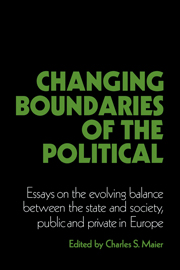 Changing Boundaries of the Political
Changing Boundaries of the Political Book contents
- Frontmatter
- Contents
- List of contributors
- Acknowledgments
- Introduction
- Part I Re-forming the political
- Part II Changing boundaries of political activity
- 5 Long waves in the development of welfare systems
- 6 Family, women, and the state: notes toward a typology of family roles and public intervention
- 7 Health care and the boundaries of politics
- 8 The politics of Wissenschaftspolitik in Weimar Germany: a prelude to the dilemmas of twentieth-century science policy
- 9 The survival of the state in European international relations
- Part III Uncertain boundaries for political economy
- Index
8 - The politics of Wissenschaftspolitik in Weimar Germany: a prelude to the dilemmas of twentieth-century science policy
Published online by Cambridge University Press: 05 June 2012
- Frontmatter
- Contents
- List of contributors
- Acknowledgments
- Introduction
- Part I Re-forming the political
- Part II Changing boundaries of political activity
- 5 Long waves in the development of welfare systems
- 6 Family, women, and the state: notes toward a typology of family roles and public intervention
- 7 Health care and the boundaries of politics
- 8 The politics of Wissenschaftspolitik in Weimar Germany: a prelude to the dilemmas of twentieth-century science policy
- 9 The survival of the state in European international relations
- Part III Uncertain boundaries for political economy
- Index
Summary
Science policy in crisis
It is difficult to think of a realm in which the boundaries of the political have been more ambiguous and changing in recent times than that of science and scholarship in the advanced industrial societies of the West. On the face of it, this is rather surprising. The search for truth is constitutionally protected in such societies, and the legitimacy of the quest for knowledge for its own sake, insofar as it is the subject of much thought, is seldom questioned. Formally, science and scholarship have been viewed as realms of private enterprise and activity in the sense that the choice of subjects for investigation has been left to the investigators and the problems of personnel selection and accountability have been left to internal regulation through the mechanisms of co-optation and peer review, both presumably informed by accepted and reasonably rigorous codes of methodology and evidence. Indeed, as Sir Alan Bullock has pointed out, “the core of the enterprise is a methodology and the commitment to it. The real scientists are those who add to knowledge, not their auxiliaries. This is what brought them into the business and this is what still seems to them the sacred duty.” Herein rests the claim for the autonomy of science, its self-legitimation and self-sanctification.
In practical terms, of course, there have been very material constraints on science and scholarship which have necessarily affected their autonomy, just as there is a long and often ghastly record of religious and ideological barriers to the unrestrained pursuit of knowledge.
- Type
- Chapter
- Information
- Changing Boundaries of the PoliticalEssays on the Evolving Balance between the State and Society, Public and Private in Europe, pp. 255 - 286Publisher: Cambridge University PressPrint publication year: 1987
- 1
- Cited by
